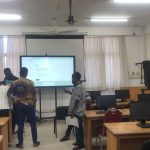An environmental social scientist and a senior research fellow at the Institute of African Studies ( IAS) at the University of Ghana, Dr. Peter Narh has called for the prioritization of proper waste management in Ghana.
While discussing the inspiration behind his current project aimed at source sorting waste products, even though his research doesn’t focus on recycling, he emphasized the importance of environmental cleanliness. He also urged the university to prioritize effective waste management, highlighting its role as a model for society.
Prof. Narh expressed these remarks during a panel discussion at the plastic waste recycling workshop organized by the Institute of Applied Sciences and Technology at the University of Ghana, under the umbrella of the PRIMUS project.
The workshop was dedicated to researching new plastic recycling technologies. Its focus was on creating technically and safety compliant recycled materials suitable for manufacturing high-value products.
“My research is not into recycling per se, but of course, as an environmental social scientist, I thought I could make a difference in cleaning our environment and conserving it in terms of managing waste better. So, I initiated a project on sorting waste together with groundmen at the highest level and some staff.”
“I think that this initiative is something that the entire university should take up, because we generate a lot of waste within the university, and yet, the university is supposed to be the exemplary of the society.”
He also stressed the need to make recycled products visible to the public while talking about the privatization nature of the recycling sector.
“Private investment in waste management, sorting, and recycling is very good. However, my observation is that things have been privatized. Change of mind and attitude is very important; however, I think there should be a key reference point for people to change their minds.”
“There must be some visible internalization of benefits for people to change their. If we are saying that waste is a resource, then the output of its transforming results should come back to communities.”
–
Story by: Abdul Razak Wahab | univers.ug.edu.gh




